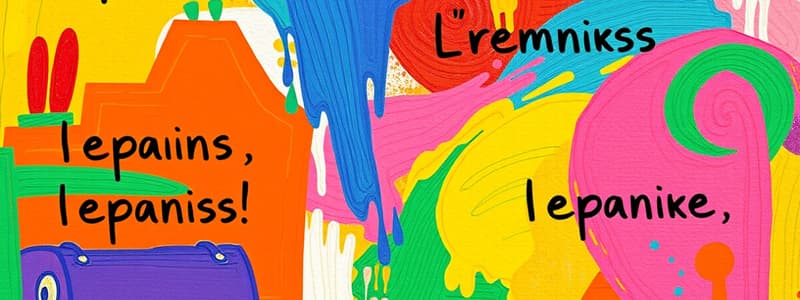Podcast
Questions and Answers
What does the cowboy call his daughter?
What does the cowboy call his daughter?
- Hijaaaaaa! (correct)
- Hijaaaaaa! (correct)
- Hijaaaaaa! (correct)
- Hijaaaaaa! (correct)
How does Luis imagine the ideal school?
How does Luis imagine the ideal school?
Closed.
What are the two words that will open many doors?
What are the two words that will open many doors?
Tire and empuje.
Why is the math notebook sad?
Why is the math notebook sad?
What does the mother mosquito warn her children about?
What does the mother mosquito warn her children about?
What conclusion does one soldier make about the people coming?
What conclusion does one soldier make about the people coming?
What did one roof say to the other roof?
What did one roof say to the other roof?
If I have four pesos in my pocket and two fall out, what do I have now in my pocket?
If I have four pesos in my pocket and two fall out, what do I have now in my pocket?
What does the little boy want to do after asking the bus fare?
What does the little boy want to do after asking the bus fare?
What happens to the centipede walking through the forest?
What happens to the centipede walking through the forest?
What does the lazy fish do?
What does the lazy fish do?
Which fruit laughs the most?
Which fruit laughs the most?
What do you call a ruined/damaged/broken ruana?
What do you call a ruined/damaged/broken ruana?
What do you call a very bad hotel?
What do you call a very bad hotel?
What do you call an angry bear?
What do you call an angry bear?
Flashcards are hidden until you start studying
Study Notes
Jokes for Spanish Class Flashcards
- Cowboy's Call: A cowboy humorously calls his daughter “¡Hijaaaaaaaaaaaaaaaa!” playing on the similarity of "hija" (daughter) to a cowboy's cheer, "yee-haa!"
- Ideal School: A student imagines the ideal school as "Cerrada" (closed), humorously indicating a desire for no school.
- Two Words: The joke reveals "Pull" and "Push" as the two words that metaphorically open doors, highlighting humor in their literal meanings.
- Sad Math Notebook: The math notebook is depicted as sad due to having "many problems," blending educational context with humor.
- Mosquito Family: A mother mosquito warns her young about humans wanting to harm them, but one interrupts, claiming a human clapped for him, suggesting a humorous misunderstanding.
- Soldier Joke: The conversation between soldiers humorously concludes friends must be arriving because they come together, playing on social dynamics.
- Roof Conversation: One roof tells another "Techo de menos," a pun on "te echo de menos" (I miss you), merging idiomatic expression with structural metaphor.
- Empty Pocket: A humorous riddle about having four pesos and losing two leads to the clever punchline of now having "a hole" in one’s pocket.
- Boy Buys Bus: A clever child's logic turns the statement of the bus fare into a humorous scenario where he claims to buy the entire bus.
- Centipede Tripping: A centipede's comedic misfortune of continuously tripping over a stick repeats "se tropezó" (tripped) multiple times, underlining the absurdity.
- Lazy Fish: The phrase “¡Nada!” (nothing/swim) refers to both the fish's laziness and the verb "nadar" (to swim), creating a clever bilingual pun.
- Laughing Orange: The orange is humorously deemed the fruit that laughs the most, with "ja ja ja" mimicking the sound of laughter in Spanish.
- Orange Laughter Connection: Highlighting that the Spanish "j" sounds like an English "h", the name "naranja" (orange) humorously aligns with laughter.
- Ruined Ruana: A play on words transforms a damaged poncho "ruana" into "ruina" (ruin), showcasing the humor in linguistic similarities.
- Nightmare Hotel: Combines “posada” (inn or hotel) with “pesadilla” (nightmare) to create the humorous neologism “posadilla,” a bad hotel experience.
- Angry Bear: The phrase “¡Furioso!” (Furious) cleverly labels an angry bear, using a straightforward yet amusing descriptor.
Studying That Suits You
Use AI to generate personalized quizzes and flashcards to suit your learning preferences.




